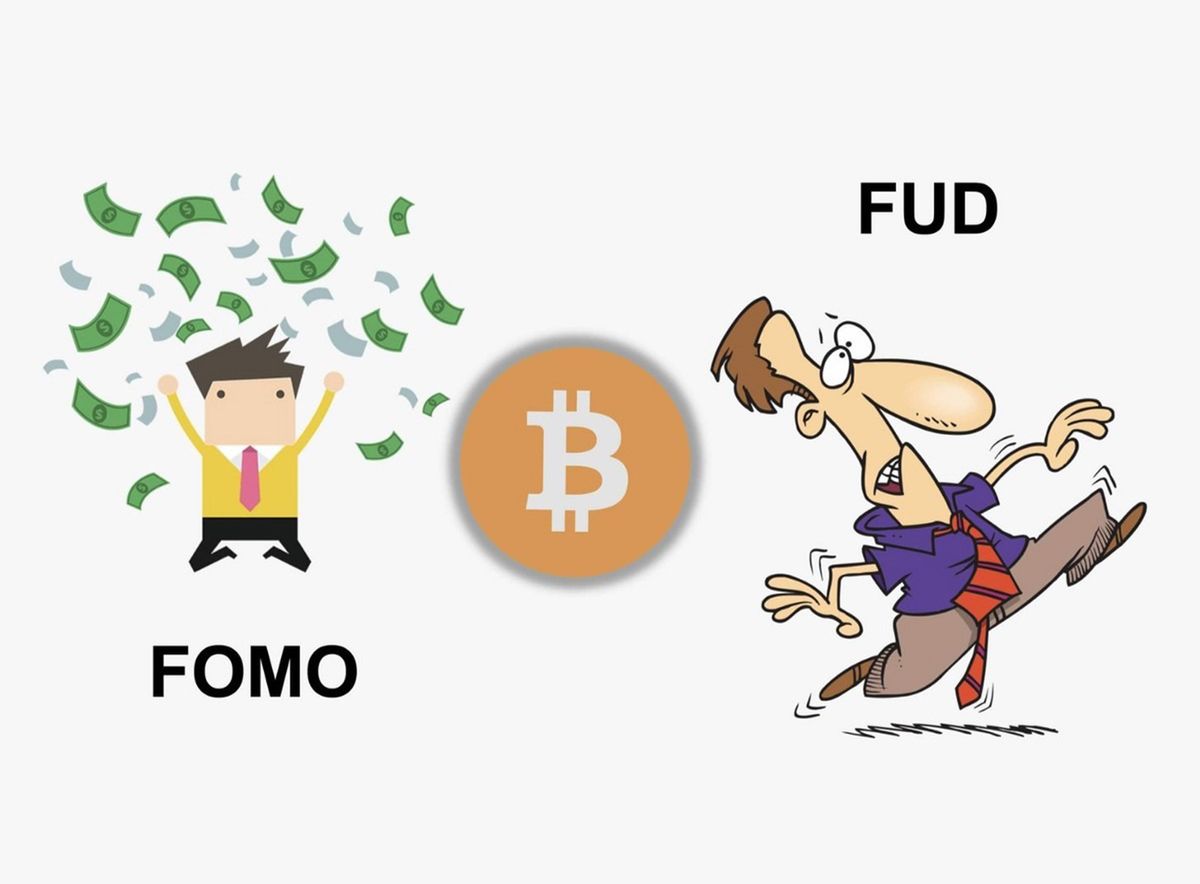1. What is Fear, Uncertainty and Doubt (FUD)?

Fear, Uncertainty, and Doubt (FUD) is a psychological phenomenon that investors experience when they are exposed to negative or misleading information about an asset, causing them to question its future viability. In the crypto world, FUD is particularly prevalent due to the high volatility and speculative nature of the market.
FUD may arise from various sources—some intentional, such as market manipulation tactics, and others simply from external factors like rumors or negative press coverage. The goal is to influence traders and investors, often resulting in panic-selling or knee-jerk reactions that cause a decrease in an asset's price.
FUD can occur for different reasons, including:
-
A sudden regulatory crackdown
-
Negative rumors or fake news about a particular cryptocurrency or blockchain project
-
Exaggerated concerns about security or environmental issues
-
Public statements from prominent figures who express skepticism or disapproval of crypto assets
2. Examples of FUD in the Crypto Market

FUD is often spread by influencers, news outlets, or even rival projects within the crypto ecosystem. Below are some common examples of how FUD manifests in the crypto space:
Government regulation
Concerns over government regulation frequently trigger FUD, especially in countries with uncertain crypto policies. The lack of clear rules about crypto taxes, usage, or legal status can cause investors to doubt the stability of the market. For instance, when China frequently announces plans to ban or restrict cryptocurrency trading, media outlets often exaggerate these claims, triggering FUD across the global crypto market.
Energy consumption and environmental concerns
Another common example of FUD surrounds the environmental impact of Proof of Work (PoW) cryptocurrencies like Bitcoin. Critics argue that Bitcoin mining consumes enormous amounts of energy, which could potentially harm the environment. While there are counterarguments, including the use of renewable energy sources in mining, this issue can still be manipulated to create doubt about Bitcoin’s future.
High-profile opposition to crypto
Famous personalities, such as Warren Buffett, have made public statements against Bitcoin and cryptocurrencies in general. Buffett has openly criticized Bitcoin as being speculative and having no intrinsic value. Such remarks can spark FUD, leading some investors to question the long-term potential of the crypto market.
3. The Impact of FUD on the Crypto Market
.jpg)
FUD can significantly influence market behavior, often leading to unpredictable market movements. The effects of FUD on the cryptocurrency market include:
Increased market volatility
The crypto market is already highly volatile, and the introduction of FUD amplifies this volatility. Investors who are influenced by fear, uncertainty, or doubt may decide to sell their holdings impulsively, resulting in sudden price drops. These sell-offs can snowball, as others may panic and follow suit.
Loss of investor confidence
Repeated exposure to FUD, even if not grounded in truth, can reduce overall investor confidence in the cryptocurrency market. As trust in the stability of the market erodes, investors may hesitate to invest or withdraw their funds entirely, further exacerbating the problem.
Knee-jerk reactions and poor decision-making
FUD often leads investors to make emotional, rather than rational, decisions. Panic selling, for example, may occur even in the face of unfounded rumors. This behavior can cause them to sell their assets at a loss, only to regret it when prices rebound. These poor decisions, driven by FUD, can have long-term negative consequences on an investor’s portfolio.
4. FUD vs FOMO: Key Differences

While FUD and FOMO (Fear of Missing Out) are both psychological drivers in the market, they have opposing effects on investor behavior.
| Aspect | FUD | FOMO |
| Causes | Negative or exaggerated info, often spread intentionally | Anxiety from seeing others succeed, fear of missing out on potential gains |
| Consequence | Panic selling, causing price drops | Impulsive buying at high prices, leading to losses |
| Impact | Market manipulation, eroding confidence | Inflated market bubbles, often driven by emotion |
| Emotions | Fear, uncertainty, doubt | Impulsiveness, anxiety, regret |
FUD (Fear, Uncertainty, and Doubt)
FUD typically spreads negative information and is often used to drive investors to sell assets out of fear. It is a market manipulation tactic that can lead to substantial losses for investors who act on it without verifying the information.
FOMO (Fear of Missing Out)
In contrast, FOMO causes investors to rush into buying an asset they think might skyrocket in value, often influenced by seeing others profit from the asset’s rise. This can lead to buying at the peak of a market bubble and later experiencing significant losses when prices crash.
5. Why is it important to be aware of FUD?

Being aware of FUD is crucial for investors looking to navigate the crypto market rationally. Ignoring or reacting impulsively to FUD can lead to poor decision-making and missed opportunities. Here are key reasons why understanding and managing FUD is essential:
-
Informed decision-making
In the crypto space, information is power, but it’s essential to critically assess the source of the information. Relying on rumors or unverified claims could lead to misguided trading decisions. Always question the authenticity of information and seek out reputable sources for confirmation.
-
Preventing manipulation
FUD can often be a tactic for market manipulation. Investors may attempt to create panic and profit from a decrease in asset prices. By recognizing FUD, traders can avoid falling into these traps and making emotional trading decisions.
-
Safeguarding investments
Not all information labeled as FUD is entirely false. While some negative news might be exaggerated or false, some could have a legitimate basis. It’s crucial to verify and assess potential risks before making a decision about an asset. Keeping a level head will help safeguard investments from short-term market movements driven by FUD.
6. How can I check if FUD is real?
.jpg)
When confronted with potentially misleading information, it’s essential to verify the facts before reacting. Here are some steps to help confirm whether FUD is based on real information:
Evaluate the source
Look at the credibility of the individual or platform spreading the information. Even well-known figures or accounts can spread misinformation. Cross-reference the information with reputable crypto news outlets or official sources related to the project.
Check for evidence and data
Blockchain transparency allows for independent verification of transactions, market data, and other relevant details. Use tools like Etherscan or CoinGecko to investigate claims about specific assets.
Fact-checking
Use crypto analysis platforms like Messari, CoinMarketCap, or DeFiLlama to verify token details, market trends, and overall project health. Ensure you’re not taking information at face value—dig deeper and ask critical questions.
7. Who causes the FUD effect?

The FUD (Fear, Uncertainty, and Doubt) effect can be triggered by various individuals and organizations. Here are some key groups that frequently contribute to FUD:
- Large Investors (Whales)
Whales often use FUD to manipulate the market in their favor. By triggering panic through massive sell-offs, they can drive prices down, enabling them to buy assets at a discount.
- Competitors
In the cryptocurrency market, competing projects may employ FUD tactics to undermine confidence in their rivals. For instance, a new project might release negative news about an established competitor to create uncertainty and attract investors to their side.
- Media Outlets
Media plays a significant role in spreading FUD. Articles and news reports containing negative or inaccurate information about a cryptocurrency project can quickly go viral, influencing public perception and investor confidence.
- Hackers and Scammers
Hackers and scammers often use FUD to sow uncertainty about a project's security. By spreading false information or orchestrating cyberattacks, they can erode investor trust and diminish the value of a cryptocurrency.
8. Classic FUD Scenarios

Throughout history, several high-profile FUD events have had a profound impact on the cryptocurrency market.
8.1. Mt. Gox
In 2014, Mt. Gox, one of the largest Bitcoin exchanges, was hacked, resulting in the loss of approximately 850,000 Bitcoin worth billions of dollars. This incident caused widespread panic and FUD in the crypto community, shaking investor confidence in Bitcoin and other cryptocurrencies.
8.2. China Banning Bitcoin
China has repeatedly announced bans or restrictions on Bitcoin mining and trading. Each announcement caused significant market downturns driven by FUD. Although these bans were not always fully enforced, they led to substantial volatility in the crypto market.
8.3. Elon Musk’s Statements
One notable example occurred in May 2022 when Elon Musk, Tesla’s CEO, announced that Tesla would no longer accept Bitcoin as payment. This declaration caused Bitcoin’s price to drop by approximately 5% immediately and further decline by 13%, pulling its value below $50,000 and reducing its market capitalization to around $360 billion.
Before this, Musk had praised Bitcoin as a potential hedge against inflation, and Tesla, along with other prominent investors, had acquired significant Bitcoin holdings. Tesla’s Bitcoin sales earned profits for the company, but Musk’s statements also contributed to Bitcoin’s price fluctuations.
Similarly, Dogecoin experienced a 30% drop after a Musk statement. However, when Musk later announced that Tesla would accept Dogecoin as payment, its value rebounded by more than 25%.
Final thoughts
Fear, Uncertainty, and Doubt can have a significant impact on the crypto market. Investors should be cautious when confronted with negative or exaggerated information and always seek to verify it through reliable sources. In a volatile market like crypto, managing FUD effectively is essential for making informed, well-reasoned decisions that protect investments. Always remember to do your own research (DYOR) and question the narrative before reacting to any claims, whether bullish or bearish.
Read more:

 English
English Tiếng Việt
Tiếng Việt.png)
.jpg)

.jpg)
.jpg)
.jpg)

.jpg)
.jpg)

.jpg)
.jpg)
.jpg)




